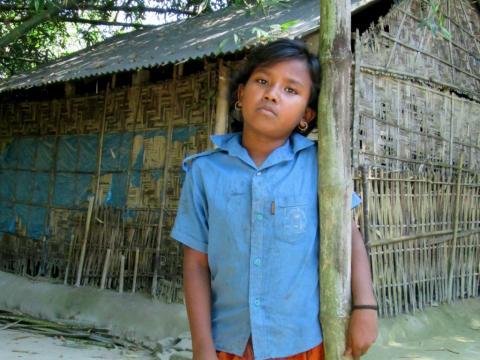Two realities – With and without a birth certificate

By: Golam Ehsanul Habib, Communications Officer, Bangladesh
Many Bangladeshi children do not have birth certificates, which excludes them from state support.
Here, we meet two children from the same north-west village illustrate the issue: one abandoned by her parents and barred from school until she can prove her identity; and the other given a fresh start after receiving his certificate of birth.
WITHOUT A BIRTH CERTIFICATE, TRISNA IS EXCLUDED
“I have many dreams, but I don’t know how I can fulfil them,” says Trisna Rani.
The 10-year-old hails from Bangladesh’s north-west region of Ghoraghta, where she lives with her grandparents. Her grandmother says her parents abandoned her when she was only 3 years old. Her grandparents are very poor and do not have enough land to survive, so Trisna lives in very vulnerable conditions.
Sometimes she has no food, she is in desperate need of clothes and her grandparents are unable to look after her properly.
Indeed, they rely on her to do the household chores.
Trisna says, “I feel upset when I see my friends going to school. If my parents were with me, I could go to school like them.”
She doesn’t have a birth certificate because her grandparents haven’t registered her birth with the local authorities and are unaware of the benefits it would bring.
With few friends to play with, Trisna is often alone, spending her time thinking that if only her parents were there, she would have everything she wanted. She adds, “I want to learn to read at school, but I don’t know when it will be possible.”
In order for Trisna to enroll in school, she would have to have a birth certificate.
WITH A BIRTH CERTIFICATE, SOJIB IS REACHING FOR HIS DREAMS
“I want to be a writer. I have a dream that one day my articles and poems will be published and I’ll be famous,” says 12-year-old Sojib, who also lives Trishna’s community.
He studies in Grade 7 at a local state school for boys.
Sojib’s father is a farmer and his mother is a housewife. He has one older sister, who is in Grade 10.
Until six years ago, the siblings lived in very challenging conditions. Poverty and hunger were commonplace, with the two children always demanding food and toys from their parents. With their father’s meagre income being insufficient to fund their basic needs, the family began looking for help to overcome their plight.
Meanwhile, World Vision started work in their community as part of its Ghoraghat development programme, with the organisation enrolling Sojib onto its child sponsorship scheme. As a registered child, the family had the opportunity to receive various forms of World Vision support, including interventions to raise awareness among the community of the importance of birth registration. Until 2009, birth registration was rare in Bangladesh and there were inconsistencies within the old laws, which were amended and reissued in 2010.
World Vision works with the local government in Ghoraghat to run awareness campaigns on the revised birth registration laws to ensure citizens achieve their basic rights. Following World Vision’s action, Sojib applied for his own birth certificate, with the paper entitling him to basic government support, enrolment in a state school and treatment at the public health clinic. Also, his school helped him to participate in the different levels of the government support programme.
Sojib has written 10 short plays, which other local children have performed, while the boy also loves playing cricket when he’s not helping his father with farming tasks or taking care of their cattle with his mother.
His mother says, “It was difficult for us to get any support from the government without a birth certificate, but everything is easy now. So I’ve told my neighbours to apply for their children’s birth certificates too.”

